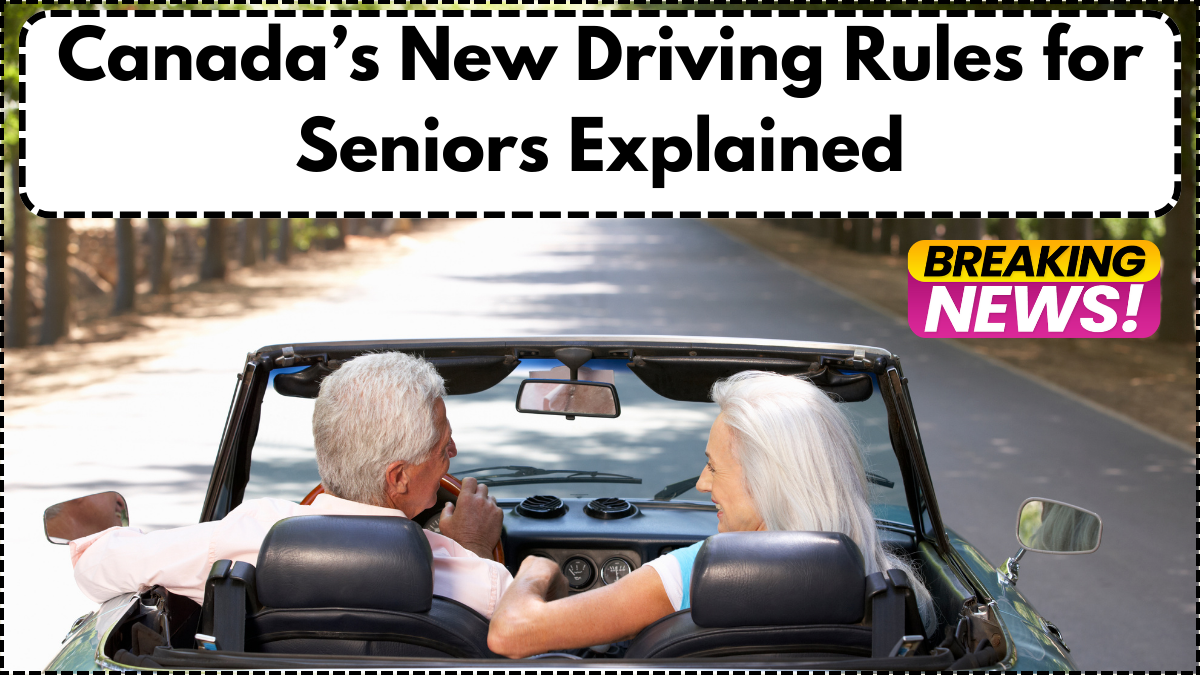Canada has rolled out several revisions to its senior driving policies. These changes aim to balance road safety with the independence and mobility of older adults. With an aging population, provinces are taking more active steps to ensure senior drivers remain competent behind the wheel. From new assessment protocols to tailored licensing options, here’s a complete overview of what’s changing and how it affects Canadians aged 65 and above.

What’s New in the 2025 Senior Driving Framework
Canada’s senior driving rules now include updated mandatory assessments starting at age 75, with earlier voluntary assessments encouraged at age 70. These evaluations focus on vision, cognitive ability, and reaction time—key factors in determining whether someone can continue to drive safely.
Some provinces like Ontario and British Columbia are introducing digital tools to streamline medical reporting between physicians and licensing bodies. In Alberta, simulated driving tests have been added to re-evaluation programs for seniors flagged by medical professionals. Additionally, refresher courses tailored for senior drivers are becoming more widely available and, in some cases, subsidized.
How the New Rules Affect Senior Drivers
Senior drivers will notice that renewal procedures now come with stricter checks. For instance, a driver aged 80 may need to undergo a vision exam and cognitive screening every two years. Failing any of these assessments doesn’t mean an automatic license suspension—but it can lead to conditional licensing or required driving training.
The good news is that Canada’s senior driving rules prioritize maintaining independence wherever possible. Conditional licenses might restrict driving to daylight hours or within a certain radius from home, giving seniors flexibility while enhancing safety. These provisions reflect growing research suggesting that tailored driving privileges are more effective than outright bans.
Key Senior Driving Rule Changes by Province (2025)
| Province | Assessment Age | Evaluation Frequency | Conditional Licenses | Digital Integration |
|---|---|---|---|---|
| Ontario | 75 | Every 2 years | Yes | Yes |
| British Columbia | 75 | Every 2 years | Yes | Yes |
| Alberta | 75 | Case-by-case | Yes | Partial |
| Quebec | 75 | Every 2 years | Yes | No |
| Nova Scotia | 75 | Every 2 years | Yes | No |
Why These Rules Matter More Than Ever
According to the Canadian Automobile Association, drivers over the age of 70 are more likely to be involved in certain types of collisions, particularly at intersections. The new Canada senior driving rules are designed to reduce such risks without compromising dignity or autonomy. These policies reflect a broader move toward proactive healthcare, as physicians now play a more active role in driver fitness evaluations.
This shift is also a response to technological changes. With more advanced driver-assist systems in newer cars, seniors must stay updated not only with their physical fitness but also with the vehicles themselves. Training modules that explain how to use features like lane assist or emergency braking are becoming part of the licensing process for seniors.
Conclusion: Proactive Driving for a Safer Future
Canada’s approach to senior driving in 2025 is clear: safety and autonomy can go hand in hand. With consistent check-ups, flexible licensing, and better access to training, older adults can continue driving with confidence. These reforms aren’t about limiting freedom—they’re about adapting to a changing demographic with compassion and foresight.
FAQ
What age do senior driving assessments begin in Canada?
In most provinces, mandatory driving assessments begin at age 75, though some suggest voluntary assessments as early as 70.
Will seniors lose their license automatically if they fail a test?
Not necessarily. Failing an assessment may lead to conditional licenses or additional training rather than an outright suspension.
Are refresher driving courses mandatory for seniors?
While not mandatory in all provinces, refresher courses are highly recommended and sometimes subsidized, depending on the region.
Can a senior appeal a license decision?
Yes, most provinces allow appeals through medical reassessments or driving retests.
Are the rules the same across Canada?
No. Each province has its own system, although many follow similar frameworks regarding age and evaluation frequency.
For More Information Click Here



